(人教版)初二上册英语单词词组句型和语法知识点
新人教版八年级上册英语知识点总结

新人教版八年级上册英语知识点总结
本文档总结了新人教版八年级上册英语的重要知识点。
一、基础语法知识
1. 时态和语态:包括一般现在时、一般过去时、一般将来时等常用时态,以及被动语态的构成和用法。
2. 名词:介绍了可数名词和不可数名词的区别,以及名词所有格的构成。
3. 代词:包括主格代词、宾格代词、形容词性物主代词和名词性物主代词的用法。
4. 形容词和副词:介绍了形容词和副词的比较级和最高级的构成规则,以及修饰方式的区别。
5. 介词:包括常用介词的用法和搭配,如in, on, at等。
6. 句子结构:主谓结构、主谓宾结构、并列句和复合句的构成和用法。
二、词汇与阅读技巧
1. 新词汇:列举了本册教材中出现的重要词汇,并给出了中文翻译和例句。
2. 阅读技巧:提供了阅读理解的技巧和方法,如快速阅读、略读和细读等。
三、听力技巧和口语表达
1. 听力技巧:介绍了有效提高听力理解能力的方法,包括听前预测、留意关键词等。
2. 口语表达:列举了常用口语表达,如问路、购物和介绍自己等。
四、写作技巧和语法点
1. 写作技巧:讲解了句子的结构和连接词的使用,以及一些常用写作句型和表达方式。
2. 语法点:解析了本册教材中出现的语法规则和用法,包括动词的时态和语态、名词的所有格等。
该文档总结了新人教版八年级上册英语的重要知识点,希望能对学生们的研究有所帮助。
(800字)。
人教版八年级上册英语语法、短语和知识点总结归纳

人教版八年级上册英语语法、短语和知识点总结归纳一、语法1. 一般现在时- 用法:表示经常性或惯性的动作或状态。
- 结构:主语 + 动词原形 (+ 其他成分)- 示例:I play soccer every weekend.2. 一般过去时- 用法:表示过去某个时间点或一段时间内发生的动作或存在的状态。
- 结构:主语 + 动词过去式 (+ 其他成分)- 示例:She watched a movie last night.3. 现在进行时- 用法:表示现在正在发生的动作。
- 结构:主语 + am/is/are + 动词-ing (+ 其他成分)- 示例:They are studying for the exam.4. 现在完成时- 用法:表示动作或状态发生在过去某个时间点,但与现在有关。
- 结构:主语 + have/has + 动词过去分词 (+ 其他成分)- 示例:I have finished my homework.5. 情态动词- 用法:表示能力、意愿、可能性等。
- 常见的情态动词有 can, could, may, might, must, should, ought to 等。
- 示例:He should go to bed early.二、短语1. as well as- 用法:表示两个事物同时存在或发生。
- 示例:She can speak English as well as Chinese.2. in order to- 用法:为了做某事。
- 示例:They woke up early in order to catch the train.3. by the way- 用法:用于引入一个新的话题或问题。
- 示例:By the way, have you seen the latest movie?三、知识点1. 直接引语和间接引语- 直接引语:用引号括起来的原话。
- 间接引语:将直接引语转述为陈述句或疑问句。
人教版八年级英语上册知识点总结和复习要点
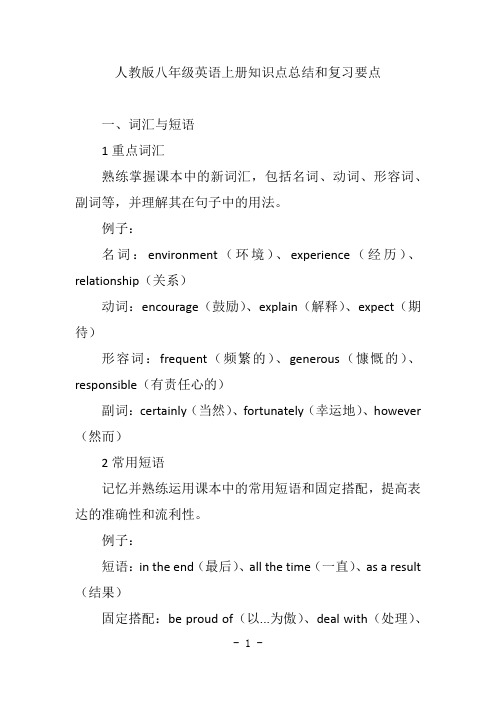
人教版八年级英语上册知识点总结和复习要点一、词汇与短语1重点词汇熟练掌握课本中的新词汇,包括名词、动词、形容词、副词等,并理解其在句子中的用法。
例子:名词:environment(环境)、experience(经历)、relationship(关系)动词:encourage(鼓励)、explain(解释)、expect(期待)形容词:frequent(频繁的)、generous(慷慨的)、responsible(有责任心的)副词:certainly(当然)、fortunately(幸运地)、however (然而)2常用短语记忆并熟练运用课本中的常用短语和固定搭配,提高表达的准确性和流利性。
例子:短语:in the end(最后)、all the time(一直)、as a result (结果)固定搭配:be proud of(以...为傲)、deal with(处理)、pay attention to(注意)二、句型与语法1基本句型熟练掌握五种基本句型,包括主语+谓语、主语+谓语+宾语、主语+谓语+间接宾语+直接宾语、主语+谓语+宾语+宾语补足语、主语+系动词+表语。
例子:主语+谓语:She sings.(她唱歌。
)主语+谓语+宾语:I like apples.(我喜欢苹果。
)主语+谓语+间接宾语+直接宾语:He gave me a book.(他给了我一本书。
)主语+谓语+宾语+宾语补足语:I found the book interesting.(我发现这本书很有趣。
)主语+系动词+表语:She is beautiful.(她很漂亮。
)2时态深入学习并掌握现在完成时、过去进行时、一般将来时、过去将来时等时态的用法和形式。
例子:现在完成时:I have already seen that movie.(我已经看过那部电影了。
)过去进行时:They were playing football when I called them.(我打电话给他们时,他们正在踢足球。
人教版八年级英语上册语法总结

人教版八年级英语上册语法总结一、一般现在时。
1. 概念。
- 表示经常或习惯性的动作或状态;表示客观事实或普遍真理。
- 例如:I often get up at six o'clock.(经常的动作)- The earth goes around the sun.(客观真理)2. 动词形式。
- 当主语是第三人称单数(he/she/it等)时,动词要加 -s或 -es。
- 一般情况加 -s,如:like - likes;以s, x, ch, sh, o结尾的动词加 -es,如:go - goes, watch - watches;以辅音字母 + y结尾的动词,把y变为i再加 -es,如:study - studies。
- 当主语不是第三人称单数时,动词用原形。
例如:They play football every day.3. 句型结构。
- 肯定句:主语+动词(原形/第三人称单数形式)+其他。
- 否定句:主语+don't/doesn't+动词原形+其他。
(do not = don't,does not = doesn't)- 一般疑问句:Do/Does+主语+动词原形+其他?回答:Yes, 主语+do/does. No, 主语+don't/doesn't.二、一般过去时。
1. 概念。
- 表示过去某个时间发生的动作或存在的状态。
- 例如:I went to the park yesterday.2. 动词形式。
- 一般动词在词尾加 -ed,如:play - played;以不发音的e结尾的动词加 -d,如:live - lived;以重读闭音节结尾且末尾只有一个辅音字母的动词,双写这个辅音字母再加 -ed,如:stop - stopped;以“辅音字母 + y”结尾的动词,把y变为i再加 -ed,如:study - studied。
还有一些不规则动词,如:go - went, see - saw等。
初二英语上册知识点 人教版

初二英语上册知识点人教版一、语法知识点1. 时态在初二英语上册中,我们学习了多种时态,包括一般现在时、一般过去时、一般将来时等。
在使用时态时,我们需要根据句子的语境和时间线来选择合适的时态,以表达正确的时间关系。
2. 名词和代词初二英语上册也涉及到了名词和代词的使用。
我们学习了不同的名词和代词的形式及其在句子中的作用。
同时,还学习了名词的复数形式、所有格以及指示代词的用法等。
3. 时刻词和频率副词初二英语上册中,我们学习了一些表示时间的词语,如:now、then、today、yesterday等。
同时,还学习了一些表示频率的副词,如:always、usually、sometimes、never等。
掌握这些词语的使用,可以帮助我们更准确地描述事件的发生时间和频率。
二、词汇知识点1. 单词拼写在初二英语上册中,我们学习了许多新的单词。
为了正确地理解和使用这些单词,我们需要注意它们的拼写。
通过词汇练习,我们可以提高自己的单词拼写能力。
2. 同义词和反义词初二英语上册也涉及到了一些同义词和反义词的使用。
学习这些同义词和反义词可以帮助我们更准确地表达自己的意思,并加深对单词的理解和记忆。
三、阅读技巧初二英语上册中,我们进行了大量的阅读练习。
通过阅读不同类型的文章,我们可以提高自己的阅读理解能力。
同时,我们也学习了一些阅读技巧,如:快速阅读、扫读和细读等。
这些技巧可以帮助我们更高效地获取信息。
四、写作技巧初二英语上册中,我们也进行了一些写作练习。
通过写作练习,我们可以提高自己的写作能力和表达能力。
同时,我们学习了一些写作技巧,如:使用连词、过渡词和衔接词等,以及正确地使用标点符号。
五、听力技巧初二英语上册中,我们进行了一些听力训练。
通过听力练习,我们可以提高自己的听力理解能力。
同时,我们学习了一些听力技巧,如:听取关键词、注意听力材料的上下文等。
这些技巧可以帮助我们更好地理解听力材料。
以上是初二英语上册的一些知识点和技巧。
人教版初二上册英语单词词组句型和语法知识点
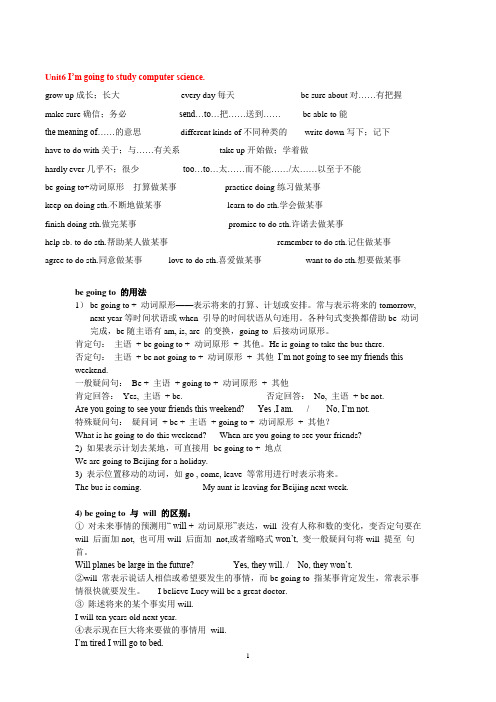
Unit6 I’m going to study computer science.grow up成长;长大every day每天be sure about对……有把握make sure确信;务必send…to…把……送到…… be able to能the meaning of……的意思different kinds of不同种类的write down写下;记下have to do with关于;与……有关系take up开始做;学着做hardly ever几乎不;很少too…to…太……而不能……/太……以至于不能be going to+动词原形打算做某事practice doing练习做某事keep on doing sth.不断地做某事learn to do sth.学会做某事finish doing sth.做完某事promise to do sth.许诺去做某事help sb. to do sth.帮助某人做某事remember to do sth.记住做某事agree to do sth.同意做某事love to do sth.喜爱做某事want to do sth.想要做某事be going to 的用法1)be going to + 动词原形——表示将来的打算、计划或安排。
常与表示将来的tomorrow, next year等时间状语或when 引导的时间状语从句连用。
各种句式变换都借助be 动词完成,be随主语有am, is, are 的变换,going to 后接动词原形。
肯定句:主语+ be going to + 动词原形+ 其他。
He is going to take the bus there.否定句:主语+ be not going to + 动词原形+ 其他I’m not going to see my friends thisweekend.一般疑问句:Be + 主语+ going to + 动词原形+ 其他肯定回答:Yes, 主语+ be. 否定回答:No, 主语+ be not.Are you going to see your friends this weekend? Yes ,I am. / No, I’m not.特殊疑问句:疑问词+ be + 主语+ going to + 动词原形+ 其他?What is he going to do this weekend? When are you going to see your friends?2) 如果表示计划去某地,可直接用be going to + 地点We are going to Beijing for a holiday.3) 表示位置移动的动词,如go , come, leave 等常用进行时表示将来。
人教版八上英语知识点

人教版八上英语知识点人教版八年级上册英语知识点概述一、词汇与短语1. 基础词汇- 家庭成员:mother, father, sister, brother, grandfather, grandmother, etc.- 学校科目:math, English, Chinese, physics, history, etc. - 日常活动:get up, go to school, havebreakfast/lunch/dinner, do homework, etc.- 常见食物:apple, banana, chicken, rice, noodles, etc.- 动物与宠物:dog, cat, fish, bird, etc.2. 短语- 问路:Excuse me, where is the...?- 购物:Can I help you? How much is it?- 餐馆用语:A table for two, please. I'd like some...- 学校用语:Let's begin. Take notes. Pay attention, please.二、语法点1. 一般现在时- 表示经常性或习惯性的动作。
- 动词第三人称单数的变化规则。
2. 一般过去时- 表示过去某一确定时间发生的动作或状态。
- 规则动词和不规则动词的过去式。
3. 现在进行时- 表示正在进行的动作。
- 构成:am/is/are + V-ing。
4. 可数名词与不可数名词- 可数名词的单复数形式。
- 不可数名词的量化表达。
5. 代词- 主格和宾格代词。
- 形容词性物主代词和名词性物主代词。
6. 简单句与并列句- 简单句的基本结构。
- 并列句的连接词:and, but, or, so 等。
三、阅读理解1. 阅读技巧- 快速浏览(Skimming)和详细阅读(Scanning)。
- 根据上下文推断生词的意思。
人教版八年级英语上册1-5单元知识点(词汇+句型+固定搭配)语法

Unit 1 How often do you exercise?词汇:1. how often: 多久一次7. health: 健康,12. on weekends: 在周末how many: 多少+可数名词healthy:健康的13. once a week:一周一次2. always(100%)- 总是unhealthy: 不健康,twice a week:一周两次usually(80%) –通常keep/stay healthy three times a month: 一月三次often(60%)- 经常= keep/stay in good health: 保持健康14. most: 大部分的,绝大多数的sometimes(40%)- 有时候8. get good grades: 取得好成绩all: 所有的hardly ever(20%)- 几乎不9. the same as: 与…不同15. be good for: 对…有益never(0%) 从不10. a lot of = lots of: 大量,许多+ 可数/不可数名词be bad for: 对…有坏处3. surf the internet: 上网 a lot = very much: 十分,非常,很16. how many: 多少, +可数名词4. as for: 至于,关于11. maybe: 也许,大概how much: 多少,+不可数名词5. junk food: 垃圾食品may be: 也许是,或许是(may是情态动词,be是动词原形)how much 多少钱,(问价格)6. look after = take care of:照顾12. little: 小的,a little boy: 一个小男孩17. of course = sure 当然look for: 寻找little: 少,little少→less更少→least最少(修饰不可数名词)look up: 查找(单词、信息)little: 几乎没有,否定词(修饰不可数名词)look at: 看 a little: 少许,有一点,肯定词(修饰不可数名词)few: 几乎没有,否定词(修饰可数名词)a few少许,有一点,肯定词(修饰可数名词)句型:1.How often do you exercise? →I exercise three times a week. How often does she shop? →She shops once a month.2.What do you usually do on weekends? →I usually watch TV. How often does she watch TV? →She watches TV everyday.3.How many hours do you sleep every night? 你每晚睡几个小时?→I sleep nine hours every night.How many books do you have? 你有多少本书?→I have 5 books.How much is the sweater? 这件毛衣多少钱?How much water do you have? 你有多少水?(how much: 多少,后面+不可数名词, water是不可数名词)4.What’s your favorite program? 你最喜欢的电视节目是什么?→It’s Animal World.固定搭配:try to do sth.: 尽力做某事,设法做某事try doing sth.: 试着做、尝试做某事help sb. (to) do sth: 帮助某人做某事(to可以省略)want sb. to do sth.: 想要某人做某事Unit 2 What’s the matter?词汇:1. have a cold 感冒9. few: 几乎没有,否定词(修饰可数名词)have a fever 发烧 a few少许,有一点,肯定词(修饰不可数名词)have a stomachache 肚子痛little: 几乎没有,否定词(修饰不可数名词)have a headache 头疼 a little: 少许,有一点,肯定词(修饰不可数名词)have a toothache 牙齿疼10. at the moment = now 现在,此刻have a sore throat 喉咙疼11. host family 寄宿家庭have a sore back 背部酸疼12. not…until…直到……时候才……2. lie down and have a good rest 躺下好好休息13. should 应该,情态动词,后+动词原形3. hot tea with honey 加了蜂蜜的热茶should not=shouldn’t4. ill 病了的illness 疾病14. see a doctor 看医生5. advice 建议(不可数名词)see a dentist 看牙医some advice(不能加”s”) 15. too many太多…,修饰可数名词too many students 6. be stressed out 有压力的,紧张的too much太多…,修饰不可数名词too much yin7. balance 平衡balanced 平衡的much too 太……,much too big 太大a balanced diet 平衡的饮食16. stay=keep 保持on a diet 节食keep/stay healthy8. get 变得= keep/stay in good health: 保持健康get angry 变得生气get tired 变得劳累句型:1. What’s the matter with you? = What’s the trouble with you? = What’s wrong with you? 你怎么了?→I have a cold/ have a toothache/ have a sore throat….2. Wha t’s the matter? →She has a cold.3. Does he have a cold? →Yes, he does.4. A: What’s the matter?B: I’m not feeling well.(此处不能用good) I have a cold.A: When did it start?B: About two days ago.A: That’s too bad. You should drink lots of water.B: Yes, I think so.A: I hope you feel / get better soon. 我希望你尽快好起来5. A: I have a coldB: I am sorry to hear that. (当听到对方不好的消息时使用此句)固定搭配:It is + 形容词+ (for sb.) to do sth. 做某事对某人来说是………的例句:It is easy for me to learn (learn) English. 对我来说学英语是容易的It is interesting to watch (watch) Animal World. 看动物世界时有趣的Unit 3 What are you doing for vacation?→→→本单元用现在进行时态表示将来的事情现在进行时态,即be + doing:词汇:1. go camping 去野营 6. a lot = very much 十分、非常、很2. A: What are you doing for vacation?go fishing 去钓鱼 a lot of = lots of 许多、大量B: I am going camping.go shopping 去购物7. away 向远处、离开A: That sounds nice.go swimming 去游泳go away 离开Who are you going with?go hiking 去远足B: I am going with my parents.go bike riding 去骑单车8. stay: 留、停留、呆go sightseeing 去观光旅游 3. Linda is going to Tibet next summer. (划线提问)2. how long 多久、多长时间句型:→Where is Linda going next summer?3. get back 回来get back to school 1. What are you doing for vacation?4. He’s going on the 12th. (划线提问)4. be famous for…以……而闻名→I am visiting my grandparents. →When is he going?5. leave for…离开去……地方What is your brother doing for vacation?leave →(过去式) left →He is going camping. 5. I’m staying there for a week. (划线提问)left: 左边、离开→How long are you staying?6.当听到对方提出的建议,如:What about playing basketball? How about taking a walk with me? Why not go to the movie? 为什么不去看电影?I am going camping.等句子时,回答可用以下句型:That sounds nice/ good/ interesting/. That’s a good idea. / Good idea. That sounds like a good idea./ Great等.7.当听到对方要去旅行或是准备出行时,如:I am going to Hongkong for a week. I am going hiking in the mountains.时,回答一般用以下句型:Havea good time!8.询问天气:How is the weather? 或是What’s the weather like?9.询问某人的职业:What do you do? What are you? What’s your job? 你的工作是什么?What does your mother do? What is he? 他是干什么的?10.询问某人的性格:What are you like? →I am outgoing/ shy/ quiet.What is he like? 他是个什么样的人?→He is outgoing/ shy/ quiet. 他很外向/害羞/安静10. 询问某人长的什么样子:What does he look like? 他长的什么样子?→He is of medium build/height. 他中等身材/身高.What does your father look like? →He is tall. 他很高11. 询问某人喜欢什么:What do you like? 你喜欢什么?→I like basketball. 我喜欢篮球固定搭配:1.finish doing sth 完成做某件事例:I finished doing my homework. 我完成了我的家庭作业Unit 1-3 单元课本语法知识& 在讲解畅优新课堂时补充的语法知识点与固定搭配:1.情态动词后+动词原形(do)已学情态动词:can 能够, must 必须, should 应该, may 也许. would 想,会help sb (to) do sth 帮助某人做某事2. 介词后若接动词,则接动词的ing形式:常见的:what about + doing sth? 做………怎么样?常接doing的固定搭配:1. like doing sth 喜欢做某事2. enjoy doing sth 享受做某事3. have a good/ have fun in doing sth 做某事玩的很开心4. finish doing sth 完成做某件事5. spend +(时间、金钱、精力) doing sth 花时间、金钱、精力做某事= spend +(时间、金钱、精力) on sth3. 不定式,即:to do常接不定式的固定搭配:want sb to do sth 想要某人做某事would like to do sth 想做某事tell sb to do sth 告诉某人做某事ask sb to do sth 要求某人做某事plan to do sth 计划做某事decide to do sth 决定做某事need to do sth 需要做某事forget to do sth 忘记做某事try to do sth 尽力做某事4. 不定代词+ 形容词结构例:something interesting 一些有趣的事情Unit 4 How do you get to school?词汇:1. get to: 到达arrive at: 到达+ 小地点(学校、医院…)arrive in: 到达+ 大地点(城市、国家、地区…)reach: 到达2. take the bus = by bus:坐公交车8. how long: 多久,how far:多远13. take…to…把…带到…3. take the train = by train:坐火车9. from…to…从…到…14. from: 离…的距离4. take the subway = by subway:坐地铁10. think of: 认为think about: 考虑15. not all: 不是所有5. ride one’s bike = by bike:骑单车11. around the world = all over the world: 全世界6. walk = on foot:走路12. be different from: 与…不同16. more…than…:比…更…,than: 比7. depend on: 视……而定,决定于……,依靠……17.other 其他的,形容词18. than 比others 其他的人或其他的事19. more…than…比……更……,形容词比较级的用法the other 两者中的另一个,单数概念the others 两部分中的另一部分,复数概念another 另外一个,另外的,第三个的句型:1. How do you get to school? →I take the bus. / I go to school by bus.How does she get to school? →She takes the bus. / She goes to school by bus.2. How long does it take?→It takes about/around 10 minutes. →It takes about 25 minutes to walk and 10 minutes by bus. How long does it take you to get from home to school? →It takes 25 minutes.3. How far is it from your home to school? →It’s 3 miles./10 kilometers.4. What do you think of………? = how do you like……? 你认为……怎么样?5. How far do you live from school?你住的离学校有多远→I live 10 miles from school.6. Can I help you? May I help you? →Yes, please.固定搭配:1.It takes sb. + 时间+ to do sth. 例句:It takes me 20 minutes to walk (walk)2.need to do sth. 需要做某事3.more…than…比……更……,形容词比较级的用法4 形容词的比较级&最高级:规则变化:比较级:形容词尾+“er”,最高级:+“est ”,例:big →bigger →the biggest不规则变化:三个音节及以上的形容词(比较长的形容词),比较级:前面+ more, 最高级:前面+most,例:popular 流行的→more popular更流行的→the most popular 最流行的最高级前面+“the”例:This classroom is bigger than that one. 这件教室比那间大This classroom is the biggest. 这间教室是最大的Unit 5 Can you come to my party?词汇:1. other 其他的The other 另一个(两个中的另一个) 9. have to 不得不,要…The others 另一部分(两部分中的另一部分)10. babysit= look after = take care of = care for 关心,照顾Another 另外的,另一个(三个以上中的另一个)2. the day before yesterday 前天句型:yesterday 昨天 1. Can you come to my party?today 今天Yes, I’d love to.(肯定回答)tomorrow 明天I’m sorry, I can’t. I have to……(否定回答)the day after tomorrow 后天 2. What’s today? 今天星期几,几号?(星期、日期都可以问) 3. on weekends 在周末It’s Monday the 14th. 今天14号星期一。
人教版英语八年级上册第二单元短语语法知识点总结
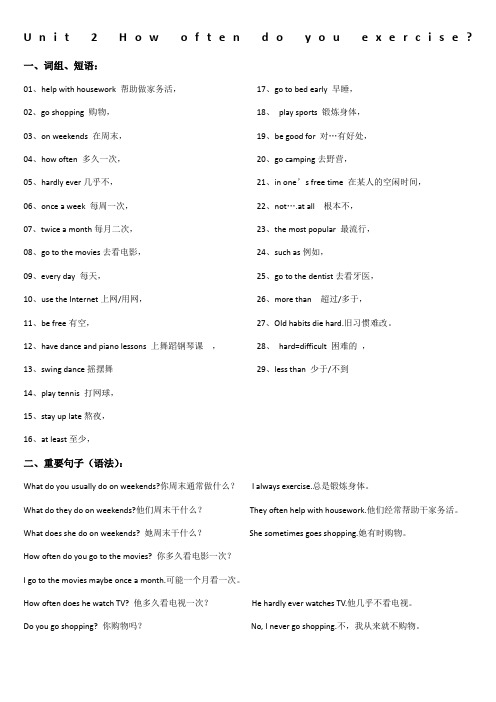
U n i t2H o w o f t e n d o y o u e x e r c i s e?一、词组、短语:01、help with housework 帮助做家务活,02、go shopping 购物,03、on weekends 在周末,04、how often 多久一次,05、hardly ever几乎不,06、once a week 每周一次,07、twice a month每月二次,08、go to the movies去看电影,09、every day 每天,10、use the Internet上网/用网,11、be free有空,12、have dance and piano lessons 上舞蹈钢琴课,13、swing dance摇摆舞14、play tennis 打网球,15、stay up late熬夜,16、at least至少,17、go to bed early 早睡,18、play sports 锻炼身体,19、be good for 对…有好处,20、go camping去野营,21、in one’s free time 在某人的空闲时间,22、not….at all 根本不,23、the most popular 最流行,24、such as例如,25、go to the dentist去看牙医,26、more than 超过/多于,27、Old habits die hard.旧习惯难改。
28、hard=difficult 困难的,29、less than 少于/不到二、重要句子(语法):What do you usually do on weekends?你周末通常做什么?I always exercise.总是锻炼身体。
What do they do on weekends?他们周末干什么?They often help with housework.他们经常帮助干家务活。
人教版八年级上册英语知识点汇总
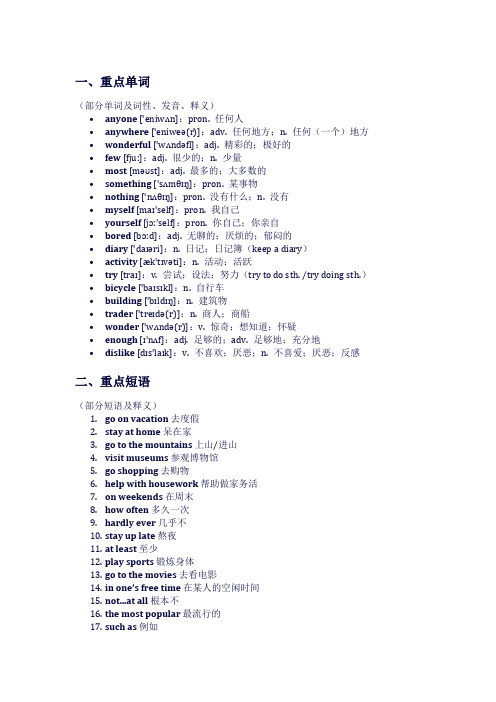
一、重点单词(部分单词及词性、发音、释义)•anyone ['eniwʌn]:pron. 任何人•anywhere ['eniweə(r)]:adv. 任何地方;n. 任何(一个)地方•wonderful ['wʌndəfl]:adj. 精彩的;极好的•few[fjuː]:adj. 很少的;n. 少量•most [məʊst]:adj. 最多的;大多数的•something ['sʌmθɪŋ]:pron. 某事物•nothing ['nʌθɪŋ]:pron. 没有什么;n. 没有•myself [maɪ'self]:pron. 我自己•yourself [jɔː'self]:pron. 你自己;你亲自•bored [bɔːd]:adj. 无聊的;厌烦的;郁闷的•diary ['daɪəri]:n. 日记;日记簿(keep a diary)•activity [æk'tɪvəti]:n. 活动;活跃•try [traɪ]:v. 尝试;设法;努力(try to do sth. /try doing sth.)•bicycle ['baɪsɪkl]:n. 自行车•building ['bɪldɪŋ]:n. 建筑物•trader ['treɪdə(r)]:n. 商人;商船•wonder ['wʌndə(r)]:v. 惊奇;想知道;怀疑•enough [ɪ'nʌf]:adj. 足够的;adv. 足够地;充分地•dislike [dɪs'laɪk]:v. 不喜欢;厌恶;n. 不喜爱;厌恶;反感二、重点短语(部分短语及释义)1.go on vacation去度假2.stay at home呆在家3.go to the mountains上山/进山4.visit museums参观博物馆5.go shopping去购物6.help with housework帮助做家务活7.on weekends在周末8.how often多久一次9.hardly ever几乎不10.stay up late熬夜11.at least至少12.play sports锻炼身体13.go to the movies去看电影14.in one’s free time在某人的空闲时间15.not...at all根本不16.the most popular最流行的17.such as例如18.play tennis打网球19.swing dance摇摆舞20.have a good time玩得愉快三、重点句型(部分句型及示例)1.Where did you go on vacation?o I went to New York City.2.Did you go out with anyone?o No, No one was here. Everyone was on vacation.3.Did you buy anything special?o Yes, I bought something for my father.4.How often do you exercise?o I go to the movies maybe once a month.5.Although many students like to watch sports, game shows are the mostpopular.o虽然很多学生喜欢看体育节目,但游戏节目依然是最受欢迎的。
初二英语知识点总结归纳上册人教版
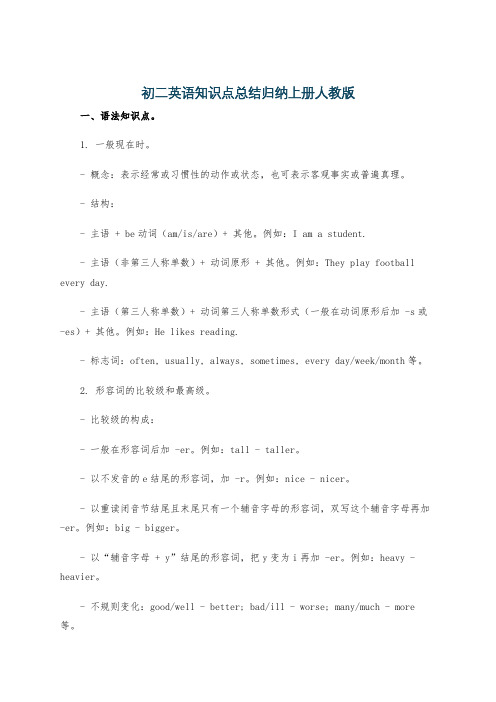
初二英语知识点总结归纳上册人教版一、语法知识点。
1. 一般现在时。
- 概念:表示经常或习惯性的动作或状态,也可表示客观事实或普遍真理。
- 结构:- 主语 + be动词(am/is/are)+ 其他。
例如:I am a student.- 主语(非第三人称单数)+ 动词原形 + 其他。
例如:They play football every day.- 主语(第三人称单数)+ 动词第三人称单数形式(一般在动词原形后加 -s或-es)+ 其他。
例如:He likes reading.- 标志词:often, usually, always, sometimes, every day/week/month等。
2. 形容词的比较级和最高级。
- 比较级的构成:- 一般在形容词后加 -er。
例如:tall - taller。
- 以不发音的e结尾的形容词,加 -r。
例如:nice - nicer。
- 以重读闭音节结尾且末尾只有一个辅音字母的形容词,双写这个辅音字母再加-er。
例如:big - bigger。
- 以“辅音字母 + y”结尾的形容词,把y变为i再加 -er。
例如:heavy - heavier。
- 不规则变化:good/well - better; bad/ill - worse; many/much - more 等。
- 比较级的用法:- 表示两者之间的比较,常用结构“比较级+than”。
例如:He is taller than me.- 最高级的构成:- 一般在形容词后加 -est。
例如:tall - tallest。
- 以不发音的e结尾的形容词,加 -st。
例如:nice - nicest。
- 以重读闭音节结尾且末尾只有一个辅音字母的形容词,双写这个辅音字母再加-est。
例如:big - biggest。
- 以“辅音字母 + y”结尾的形容词,把y变为i再加 -est。
例如:heavy - heaviest。
人教版初中英语八年级上册英语知识点归纳总结复习(单词、短语、句子、语法、练习)
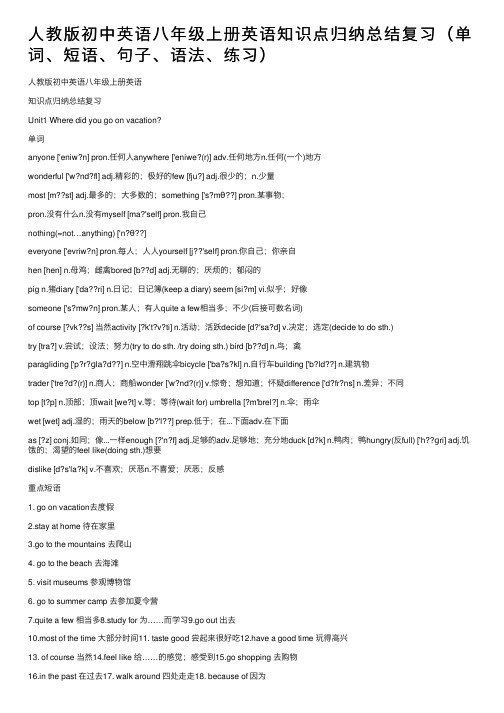
⼈教版初中英语⼋年级上册英语知识点归纳总结复习(单词、短语、句⼦、语法、练习)⼈教版初中英语⼋年级上册英语知识点归纳总结复习Unit1 Where did you go on vacation?单词anyone ['eniw?n] pron.任何⼈anywhere ['eniwe?(r)] adv.任何地⽅n.任何(⼀个)地⽅wonderful ['w?nd?fl] adj.精彩的;极好的few [fju?] adj.很少的;n.少量most [m??st] adj.最多的;⼤多数的;something ['s?mθ??] pron.某事物;pron.没有什么n.没有myself [ma?'self] pron.我⾃⼰nothing(=not…anything) ['n?θ??]everyone ['evriw?n] pron.每⼈;⼈⼈yourself [j??'self] pron.你⾃⼰;你亲⾃hen [hen] n.母鸡;雌禽bored [b??d] adj.⽆聊的;厌烦的;郁闷的pig n.猪diary ['da??ri] n.⽇记;⽇记簿(keep a diary) seem [si?m] vi.似乎;好像someone ['s?mw?n] pron.某⼈;有⼈quite a few相当多;不少(后接可数名词)of course [?vk??s] 当然activity [?k't?v?ti] n.活动;活跃decide [d?'sa?d] v.决定;选定(decide to do sth.)try [tra?] v.尝试;设法;努⼒(try to do sth. /try doing sth.) bird [b??d] n.鸟;禽paragliding ['p?r?ɡla?d??] n.空中滑翔跳伞bicycle ['ba?s?kl] n.⾃⾏车building ['b?ld??] n.建筑物trader ['tre?d?(r)] n.商⼈;商船wonder ['w?nd?(r)] v.惊奇;想知道;怀疑difference ['d?fr?ns] n.差异;不同top [t?p] n.顶部;顶wait [we?t] v.等;等待(wait for) umbrella [?m'brel?] n.伞;⾬伞wet [wet] adj.湿的;⾬天的below [b?'l??] prep.低于;在...下⾯adv.在下⾯as [?z] conj.如同;像...⼀样enough [?'n?f] adj.⾜够的adv.⾜够地;充分地duck [d?k] n.鸭⾁;鸭hungry(反full) ['h??ɡri] adj.饥饿的;渴望的feel like(doing sth.)想要dislike [d?s'la?k] v.不喜欢;厌恶n.不喜爱;厌恶;反感重点短语1. go on vacation去度假2.stay at home 待在家⾥3.go to the mountains 去爬⼭4. go to the beach 去海滩5. visit museums 参观博物馆6. go to summer camp 去参加夏令营7.quite a few 相当多8.study for 为……⽽学习9.go out 出去10.most of the time ⼤部分时间11. taste good 尝起来很好吃12.have a good time 玩得⾼兴13. of course 当然14.feel like 给……的感觉;感受到15.go shopping 去购物16.in the past 在过去17. walk around 四处⾛⾛18. because of 因为⼀碗…… 20. the next day 第⼆天21. drink tea 喝茶19. one bowl of… 22. find out 找出;查明23. go on 继续24.take photos 照相25. something important 重要的事26. up and down 上上下下27. come up 出来28. buy sth. for sb. / buy sb. sth. 为某⼈买某物29. taste + adj. 尝起来…… 动词原形除了……之外什么都没有30. look+adj. 看起来…… 31.nothing…but+32.seem+(to be)+ adj. 看起来…… 33. arrive in+⼤地点/ arrive at+⼩地点到达某地34.decide to do sth. 决定去做某事35. try doing sth. 尝试做某事/ 36. try to do sth. 尽⼒去做某事37. forget doing sth. 忘记做过某事/ 38. forget to do sth. 忘记做某事39. enjoy doing sth. 喜欢做某事40. want to do sth. 想去做某事41. start doing sth. 开始做某事42. stop doing sth. 停⽌做某事43. dislike doing sth.不喜欢做某事44. keep doing sth. 继续做某事45. Why not do. sth.? 为什么不做……呢?46. so+adj.+that+从句如此……以⾄于…… 47. tell sb. (not) to do sth. 告诉某⼈(不要)做某事48 .have a good time=enjoy oneself=have fun(doing sth.)玩得痛快三、重点句⼦:1. Where did you go on vacation? 你去哪⼉度假的?2. Long time no see. 好久不见。
人教版初二英语上册知识点
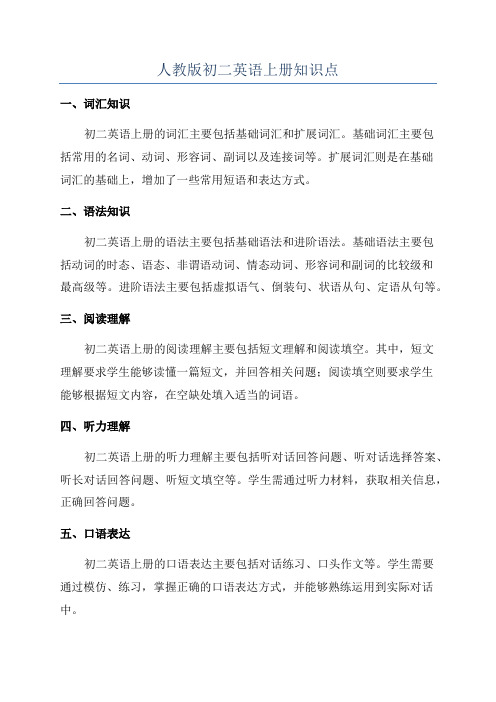
人教版初二英语上册知识点
一、词汇知识
初二英语上册的词汇主要包括基础词汇和扩展词汇。
基础词汇主要包
括常用的名词、动词、形容词、副词以及连接词等。
扩展词汇则是在基础
词汇的基础上,增加了一些常用短语和表达方式。
二、语法知识
初二英语上册的语法主要包括基础语法和进阶语法。
基础语法主要包
括动词的时态、语态、非谓语动词、情态动词、形容词和副词的比较级和
最高级等。
进阶语法主要包括虚拟语气、倒装句、状语从句、定语从句等。
三、阅读理解
初二英语上册的阅读理解主要包括短文理解和阅读填空。
其中,短文
理解要求学生能够读懂一篇短文,并回答相关问题;阅读填空则要求学生
能够根据短文内容,在空缺处填入适当的词语。
四、听力理解
初二英语上册的听力理解主要包括听对话回答问题、听对话选择答案、听长对话回答问题、听短文填空等。
学生需通过听力材料,获取相关信息,正确回答问题。
五、口语表达
初二英语上册的口语表达主要包括对话练习、口头作文等。
学生需要
通过模仿、练习,掌握正确的口语表达方式,并能够熟练运用到实际对话中。
六、写作能力
初二英语上册的写作能力主要包括书面表达、口头作文等。
学生需要
培养提取信息的能力,能够根据所给素材进行写作,表达自己的观点和想法。
以上就是人教版初二英语上册的知识点。
这些知识点是初二英语学习
的基础,学生需要扎实掌握,运用到实际学习中。
通过词汇、语法的学习,加强阅读和听力的训练,提高口语和写作的能力,学生能够有效地提高自
己的英语水平。
人教版初二英语上册知识点

人教版初二英语上册知识点一、语法知识点1. 一般现在时一般现在时表示经常性的或普遍性的动作、事实或状态。
其结构为:主语 + 动词原形。
例如:I play basketball every day.2. 一般过去时一般过去时表示过去某个时间发生的动作或状态。
其结构为:主语 + 动词过去式。
例如:I visited my grandparents last week.3. 现在进行时现在进行时表示现在正在进行的动作。
其结构为:主语 + am/is/are + 动词-ing。
例如:He is watching TV now.4. 进行时与一般现在时的区别进行时表示动作正在进行,一般现在时表示动作的经常性或普遍性。
例如:They are studying English. (进行时) vs. They study English every day. (一般现在时)5. 一般将来时一般将来时表示将来某个时间会发生的动作或状态。
其结构为:主语 + will + 动词原形。
例如:I will go to the cinema tomorrow.6. 一般将来时与现在进行时的区别一般将来时表示将来某个时间会发生的动作或状态,现在进行时表示现在正在进行的动作。
例如:I will visit my grandparents next week. (一般将来时) vs. They are visiting their grandparents this week. (现在进行时)二、词汇知识点1. 形容词比较级和最高级形容词比较级用于比较两个人或物的特点,最高级则用于比较三个或三个以上人或物的特点。
比较级的形式为:原级 +er,最高级的形式为:最高级 + est。
例如:tall (高) - taller (更高) - tallest (最高)2. 动词不定式动词不定式是动词原形加上to 构成的形式,可以作为名词、主语、宾语或状语。
- 1、下载文档前请自行甄别文档内容的完整性,平台不提供额外的编辑、内容补充、找答案等附加服务。
- 2、"仅部分预览"的文档,不可在线预览部分如存在完整性等问题,可反馈申请退款(可完整预览的文档不适用该条件!)。
- 3、如文档侵犯您的权益,请联系客服反馈,我们会尽快为您处理(人工客服工作时间:9:00-18:30)。
2013 人教版八年级上册英语知识点/单词/语法/词组Unit1 Where did you go on vacation?stay at home待在家里go on vacation去度假go to the mountains去爬山go to the beach去海滩visit museums 参观博物馆quite a few相当多go to summer camp去参观夏令营study for为……而学习go out出去most of the time大部分时间taste good尝起来很好吃of course当然have a good time玩得高兴go shopping去购物feel like给…的感觉;感受到in the past在过去walk around四处走走because of因为one bowl of…一碗……the next day第二天drink tea喝茶find out找出;查明go on继续take photos照相something important重要的事up and down上上下下come up出来buy sth. for sb. / buy sb. sth. 为某人买某物taste + adj. 尝起来……look+adj. 看起来……nothing…but+动词原形除了……之外什么都没有seem+(to be)+ adj. 看起来……arrive in+大地点/ arrive at+小地点到达某地decide to do sth. 决定去做某事try doing sth.尝试做某事/ try to do sth.尽力去做某事forget doing sth.忘记做过某事/ forget to do sth.忘记做某事enjoy doing sth.喜欢做某事want to do sth.想去做某事start doing sth.开始做某事stop doing sth. 停止做某事dislike doing sth. 不喜欢做某事keep doing sth.继续做某事Why not do. sth.? 为什么不做……呢?so+adj.+that+从句如此……以至于……tell sb. (not) to do sth. 告诉某人(不要)做某事词语辨析:1. anywhere 与somewhere 两者都是不定副词。
anywhere 在任何地方,常用于否定句和疑问句中。
I can’t find it anywhere. somewhere 在某处,到某处,常用于肯定句。
I lost my key somewhere near here.2. seem + 形容词看起来….. You seem happy today.seem + to do sth. 似乎、好像做某事I seem to have a coldI seems / seemed + 从句看起来好像…;似乎…. It seems that no one believe you.seem like ….好像,似乎….. It seems like a god idea.3. decide to do sth.决定做某事They decide to visit the museum.decide + 疑问词+ 动词不定式He can not decide when to leave.4. start doing sth = start to do sth. 开始,可与begin 互换。
He started doing his homework.但以下几种情况不能用begin .1) 创办,开办:He started a new bllkshop last month.2) 机器开动:I can’t start my car.3) 出发,动身:I will start tomorrow morning.5. over 介词,多于,超过,在…以上(表示数目、程度)= more thanMy father is over 40 years old.在…之上,与物体垂直且不接触,与under 相反。
There is a map over the blackboard.超过:I hear the news over the radio.遍及:I want to travel all over the world.6. too many 太多,后接可数名词复数:Mother bought too many eggs yesterday.too much 太多,修饰不可数名词,修饰动词作状语。
We have too much work to do. Don’t talk too much.much too 太,修饰形容词或副词。
The hat is much too big for me. You’re walking much too fast.分辨三者的口诀:too much, much too, 用法区别看后头:much 后接不可数,too 后修饰形或副。
too many 要记住,后面名词必复数。
7. because of 介词短语,因为,由于,后接名词、代词或动名词,不能接句子。
He can’t take a walk because of the rain.because 连词,因为,引导状语从句,表示直接明确的原因或理由。
I don’t buy the shirt because it was too expensive.Unit2 How often do you exercise?help with housework帮助做家务on weekends在周末how often多久一次hardly ever几乎从不once a week每周一次twice a month每月两次every day每天be free有空go to the movies去看电影use the Internet用互联网swing dance摇摆舞play tennis打网球stay up late熬夜;睡得很晚at least至少go to bed early早点睡觉such as比如;诸如ave dance and piano lessons 上舞蹈课和钢琴课play sports进行体育活动be good for对……有好处go camping去野营not…at all一点儿也不……in one’s free time在某人的业余时间the most popular最受欢迎的old habits die hard积习难改go to the dentist去看牙医morn than多于;超过less than少于help sb. with sth. 帮助某人做某事want sb. to do sth. 想让某人做某事How about…? ......怎么样?/ ……好不好?How many+可数名词复数+一般疑问句?……有多少……?主语+find+that从句. ……发现……by doing sth. 通过做某事spend time with sb. 和某人一起度过时光It’s+ adj.+ to do sth. 做某事的……的。
ask sb. about sth. 向某人询问某事What’s your favorite……? 你最喜爱的……是什么?the best way to do sth. 做某事的最好方式语法要点:What do you usually do on weekends? I always exercise.What do they do on weekends? They often help with housework.What does she do on weekends? She sometimes goes shopping.How often do you go to the movies? I go to the movies maybe once a month.How often does he watch TV? He hardly ever watches TV.Do you go shopping? No, I never go shopping.词语辨析:1. how often 多久一次,用来提问动作发生的频率。
回答用:once,twice, three times 等词语。
How often do you play sports? Three times a week.how long 多长,用来询问多长时间,也可询问某物有多长。
How long does it take to get to Shanghai from here? How long is the ruler? how for 多远,用来询问距离,指路程的远近。
How far is it from here to the park? It’s about 2 kilometers.2. free 空闲的,有空的,反义词为busy. be free 有空,闲着,相当于havetime.I’ll be free next week. = I’ll have time next week.还可作“免费的、自由的”解。
be free to do sth. 自由地做某事。
The tickets are free. You’re free to go or to stay.3. How come?怎么会?怎么回事?表示某件事情很奇怪,有点想不通;可单独使用,也可引导一个问句,相当于疑问句why, 但how come 开头的特殊疑问句使用的仍然是陈述语序。
How come Tom didn’t come to the party? = Why didn’t Tom come to the party?4. stay up late 指“熬夜到很晚,迟睡”。
Don’t stay up late next time.stay up 指“熬夜,不睡觉”。
He stayed up all night to write his story.5. go to bed 强调“上床睡觉”的动作及过程,但人不一定睡着。
I went to bedat eleven last night.go to sleep 强调“入睡,睡着,进入梦乡”。
She was so tired that she went to sleep soon.6. find + 宾语+名词, 发现:We have found him (to be) a good boy.find + 宾语+ 形容词,发现:He found the room dirty.find + 宾语+ 现在分词,发现:I found her standing at the door.7. percent 百分数,基数词+ percent:percent 没有复数形式,作主语时,根据所修饰的名词来判断谓语的单复数。
